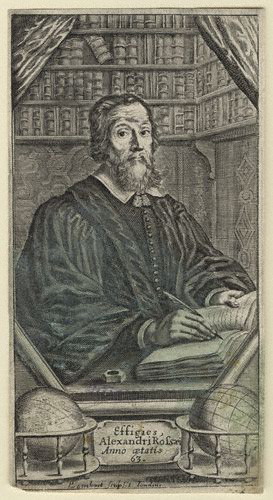Alexander Ross (writer) facts for kids
Quick facts for kids
Alexander Ross
|
|
|---|---|

Alexander Ross, 1653 engraving by Pierre Lombart.
|
|
| Born | c. 1590 Aberdeen, Scotland |
| Died | 1654 (aged 63–64) Bramshill, Hampshire, England |
| Occupation | Clergyman, translator |
| Nationality | Scottish |
| Alma mater | King's College, University of Aberdeen |
| Notable works | The Alcoran of Mahomet (the Qur'an), translated into English (attributed ) |
Alexander Ross (around 1590–1654) was a very active Scottish writer. He was known for debating different ideas. He also served as a special chaplain to King Charles I.
Life
Alexander Ross was born in Aberdeen, Scotland. He went to Aberdeen Grammar School. In 1604, he started studying at King's College, Aberdeen.
Around 1616, he became the headmaster of a school in Southampton. By 1622, he was chosen to be one of King Charles I's chaplains. A chaplain is like a religious advisor to the king.
From 1634 until his death, Ross was the vicar of St Mary's Church, Carisbrooke on the Isle of Wight. He passed away in 1654 at Bramshill House in Hampshire. He left many gifts in his will. His books went to his friend, Sir Andrew Henley.
Ross had many important friends and supporters. These included people like Lewis Watson and John Evelyn. He also wrote letters to Henry Oxenden.
His Ideas and Writings
Alexander Ross was known for defending older, traditional ideas. He was very careful about new theories. For example, he did not agree with the Copernican theory. This theory said that the Earth moves around the Sun. Ross believed the Earth stayed still.
He also debated with other thinkers of his time. He argued against ideas from people like Thomas Browne. Ross believed that crystal was a type of frozen ice. He also thought that garlic could stop a magnet from working. He also debated with Thomas Hobbes and William Harvey.
Translating the Qur'an
Alexander Ross is often given credit for translating the Qur'an into English. The Qur'an is the holy book of Islam. He translated it from a French version written in 1647. This English translation was called L'Alcoran of Mahomet.
Some people think he might not have done the full translation himself. However, he definitely helped with the book. He wrote a warning for readers at the beginning. This warning told people what to expect from the book.
Some of His Books
Alexander Ross wrote many books. Here are a few examples:
- Questions and Answers on the First Six Chapters of Genesis (1620)
- The New Planet, no Planet, or the Earth no Wandering Star, against Galilaeus and Copernicus (1640). This book argued against the ideas of Galileo and Copernicus.
- Philosophical Touchstone (1645). This book looked at ideas about the human body and soul.
- The Alcoran of Mahomet (1649). This was his famous translation of the Qur'an.
- Arcana Microcosmi (1651). This book explored secrets of the human body. It also argued against some of Thomas Browne's ideas. You can find a web version of the text online.
- The History of the World, the Second Part (1652). This continued a history book by Sir Walter Raleigh.
- Πανσεβεια (Pansebeia), or View of all the Religions in the World (1652). This book looked at different religions.
Images for kids
 | Mary Eliza Mahoney |
 | Susie King Taylor |
 | Ida Gray |
 | Eliza Ann Grier |


